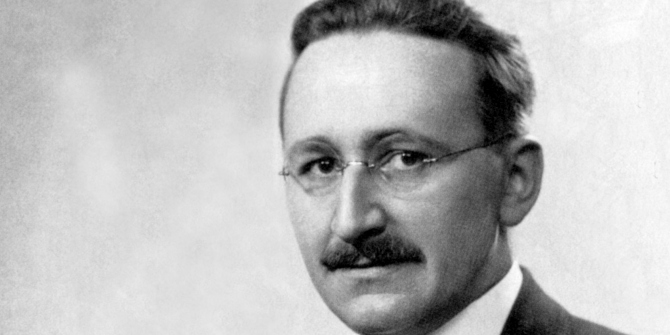 Getting people into employment will not on its own ensure decent living standards and reduce poverty, finds Peter Taylor-Gooby. His research shows that, while higher employment is associated with lower poverty, other factors are more important. The most important factor in reducing poverty levels across the countries looked at was the strength of contractual rights, and other policies, such as access to child care, policies to reduce discrimination against women were also significant.
Getting people into employment will not on its own ensure decent living standards and reduce poverty, finds Peter Taylor-Gooby. His research shows that, while higher employment is associated with lower poverty, other factors are more important. The most important factor in reducing poverty levels across the countries looked at was the strength of contractual rights, and other policies, such as access to child care, policies to reduce discrimination against women were also significant.
Most people think paid work is the royal road to a better life for people of working age. The value of work is at the centre of policy thinking across the board, from Labour’s Compulsory Jobs Guarantee to UKIP’s commitment to ‘enroll unemployed welfare claimants onto community schemes or retraining workfare programmes’. Ian Duncan Smith’s Universal Credit puts work ‘at the centre of our welfare system’. The EU’s 2020 Growth Strategy ‘is about more jobs and better lives.’ And so on.
The idea that getting people into work will solve the problem of achieving decent living standards for those of working age was given extra impetus as unemployment rose from about 5 to over 8 per cent between 2008 and 2012, paralleled with a rise in working-age poverty. Now unemployment is falling back towards pre-crisis levels but, as IFS analysis shows, poverty among working age adults is failing to respond. The poor quality of many of the new jobs indicates short-comings in the case for paid work as the foundation of welfare.
Most of those in poverty live in working households. Among families the proportion in households with at least one member in work rose from 50 to 68 per cent between 1996 and 2013 according to the DWP’s Households Below Average Incomes statistics. The job market started to recover from its low point in 2012 but many of the jobs on offer are far from satisfactory. The number of part-time workers rose from 7.2 million to 8.2 million between the recession in 2008 and 2014, the numbers of involuntary part-timers from 0.7 to 1.7 million and the number of temporary workers from 1.4 to 1.7 million. The Labour Force survey shows a doubling of zero-hour contracts between 2007 and 2013 to 300,000.
These statistics suggest that we need to pay attention to the quality as well as the quantity of jobs created. Our new research examines factors affecting employment and poverty across 17 European countries for the period of prosperity and growth between 2001 and 2007. This is the time when the sun shone, the most favourable period in recent history for the work = welfare = decent living standards project. The research shows that, even at this time, new welfare was much more successful at getting people into work than at reducing poverty.
Employment rates rose across Europe, especially for women. However, far from declining, poverty rates also increased (by the standard EU 60 per cent of median income measure) from 18 to 18.6 per cent between 2001 and 2007 in the UK, and also in other successful economies such as Germany (11 to 15.2 per cent), Sweden (9 to 11.5 per cent) or Poland (16 to 17.3 per cent). One explanation is to do with access to paid work. Governments need to make sure that even more people move into work. This is the logic that lies behind the EU’s Employment Strategy and Horizon 2020 programme and behind national work-centred policies such as Universal Credit. Then the great recession swept everyone towards work at any price policies, redoubling the stress on paid work.
These were the good times, when, if ever, the link between work and decent incomes should be strongest. Higher employment is associated with lower poverty, but the analysis shows that, even during this period, other factors were more important. In fact the most important factor in reducing poverty levels across the countries was the strength of contractual rights. Other policies such as access to child care, policies to reduce discrimination against women were also significant.
The level of employment plays a role in ensuring decent living standards, but one that is less powerful than that of employment rights. The suggestion is that while employment is probably a good thing, if we want people to be better off, we also need to make sure that the quality of jobs is adequate. The best way to ensure that is to strengthen contractual rights against dismissal and to promote trade union membership. Recent trends in policy to weaken employment protection, to undermine the role of trade unions and to introduce high fees for access to employment tribunals move us in entirely the wrong direction. Shovelling people into low-paid jobs is all the fashion, but it is not the answer to the problem of poverty among those of working age.
For more, see “Can ‘New Welfare’ Address Poverty Through More And Better Jobs?” by Peter Taylor-Gooby, Julia M. Gumy and Adeline Otto.
Note: This article gives the views of the author, and not the position of the British Politics and Policy blog, nor of the London School of Economics. Please read our comments policy before posting.
 Peter Taylor-Gooby is Research Professor of Social Policy at the University of Kent’s School of Social Policy, Sociology and Social Research. He chaired the British Academy New Paradigms in Public Policy Programme (2010/2011) and is Chair of the REF Social Work and Social Policy and Administration panel 2011-15, a Fellow of the British Academy, a Founding Academician at the Academy of Social Sciences and, previously, a Fellow of the Royal Society of Arts and President of the British Association for the Advancement of Science, Sociology and Social Policy Section.
Peter Taylor-Gooby is Research Professor of Social Policy at the University of Kent’s School of Social Policy, Sociology and Social Research. He chaired the British Academy New Paradigms in Public Policy Programme (2010/2011) and is Chair of the REF Social Work and Social Policy and Administration panel 2011-15, a Fellow of the British Academy, a Founding Academician at the Academy of Social Sciences and, previously, a Fellow of the Royal Society of Arts and President of the British Association for the Advancement of Science, Sociology and Social Policy Section.








William Morris pointed this out with exemplary English erudition over a hundred years ago when he wrote of “useful work vs. useless toil”:
“The above title may strike some of my readers as strange. It is assumed by most people nowadays that all work is useful, and by most well-to-do people that all work is desirable. Most people, well-to-do or not, believe that, even when a man is doing work which appears to be useless, he is earning his livelihood by it – he is ’employed,’ as the phrase goes; and most of those who are well-to-do cheer on the happy worker with congratulations and praises, if he is only ‘industrious’ enough and deprives himself of all pleasure and holidays in the sacred cause of labour. In short, it has become an article of the creed of modern morality that all labour is good in itself – a convenient belief to those who live on the labour of others. But as to those on whom they live, I recommend them not to take it on trust, but to look into the matter a little deeper.”
https://www.marxists.org/archive/morris/works/1884/useful.htm